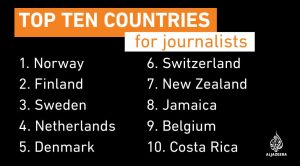By Rasheed Abubakar
According to Reporters Without Borders ratings for 2019, Norway (No 1) and Denmark (No 5) made the list of the top 10 countries which allow journalists to do their jobs without harassment or intimidation. In these countries, according to the report, “the media is free and journalists are not subject to censorship or political pressure.”
This could have been one of the reasons Denmark’s Jyllands-Posten, Norway’s Aftenposten and other western newspapers could publish controversial cartoons of Prophet Muhammad (so they said that year, 2005 and later in 2006) without censure.
It was the first time in recent years that newspapers would directly link Islam and its beloved Prophet Muhammad (SAW), the Best of Mankind, to terrorism and suicide bombing in a humorous but ignominious manner, while attributing same to freedom of speech. Of course, there were spontaneous reactions across the world from troublemakers, who took advantage of the media excesses. Innocent lives were lost and property worth billions were destroyed.
I dedicated two chapters to address the “bloody cartoon protests” in the first edition of my book, ‘Muslims and the Threats of the Media’ in 2009, exactly 10 years ago, and I didn’t only recommend intellectual debates as a way of fighting back media attacks against Islam and/or Muslims, I also suggested that “media in Norway, Denmark and other countries should be free, but that freedom should be limited because when it is uncontrollable, it may lead to destruction.”

Unfortunately, in 2010, the unrepentant Aftenposten, Norway’s largest newspaper, reprinted 5 of the 12 cartoons – just to exercise her so-called ‘freedom to insult the religious sensibilities of Muslim minorities in the country, and by extension, the 1.8 billion strong global Muslim population’. As if that was not enough, the Jyllands-Posten editor Flemming Rose, who commissioned the cartoons, was honoured by a Norwegian free speech group in 2015.
Interestingly, Norway and Denmark have been protecting Christainity and its values from press attacks for more than three centuries under their blasphemy laws that criminalise ‘insults against only Christianity’ until 2015 and 2017 respectively, when the two countries scrapped the laws – making it legal for the media to exercise its freedom of expression by “mocking” all religious beliefs.


